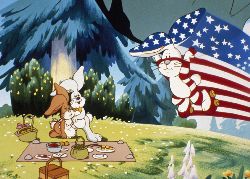Difference between revisions of "The Adventures of The American Rabbit"
Apostrophe (talk | contribs) |
UncleBastard (talk | contribs) (Oops, it was Ted Wolf who did ThunderCats, Fred Wolf did TMNT,) |
||
| Line 5: | Line 5: | ||
"Wow, look at that, he IS doing a barrel roll!"|The very last lines of the movie. Seriously.}} | "Wow, look at that, he IS doing a barrel roll!"|The very last lines of the movie. Seriously.}} | ||
'''''The Adventures of The American Rabbit''''' is an insipid [[1980s|1986]] animated movie directed by [[Wikipedia:Fred Wolf|Fred Wolf]] (of '' | '''''The Adventures of The American Rabbit''''' is an insipid [[1980s|1986]] animated movie directed by [[Wikipedia:Fred Wolf|Fred Wolf]] (of ''Teenage Mutant Ninja Turtles'' fame) about Robert Rabbit, a bunny who is transformed into a superhero to defend his friends, family and land from pollution and the Mafia. All whilst parading around in quite possibly the most [[autistic|retarded]] costume in superhero history: a rabbit painted in the stars and stripes and wearing roller skates (even though he can fly). The American Rabbit actually set the standards for Chris' perception of many things, including himself, America, storytelling, race (something that will become quickly apparent to any viewer of the film in question), honesty and respect for self and others (which, as in the movie, are given much talk for no reason whatsoever.) His claims for being truthful, honest, and decent are almost certainly informed by the shallow cartoon's glossing over of the issues in a ham-handed, incomplete, moralizing fashion. Even the famous cover for [[Sonichu 0]] is plagiarized partially, in an eerie subconscious fashion from a scene early in the film where the gay little rabbit goes out from his home village, encouraged by his father. | ||
The American Rabbit is also Chris's role model in life, on the level of [[Sonic the Hedgehog]]. In Chris's [[Wikipedia]] entry, he stated "they REALLY SHOULD HAVE MADE A TV SERIES of him." | The American Rabbit is also Chris's role model in life, on the level of [[Sonic the Hedgehog]]. In Chris's [[Wikipedia]] entry, he stated "they REALLY SHOULD HAVE MADE A TV SERIES of him." | ||
Revision as of 19:10, 27 January 2010
| “ | "I can just barely make him out. What a guy!" "Wow, it looks like he's doing a barrel roll!" [...] |
” |
| The very last lines of the movie. Seriously. | ||
The Adventures of The American Rabbit is an insipid 1986 animated movie directed by Fred Wolf (of Teenage Mutant Ninja Turtles fame) about Robert Rabbit, a bunny who is transformed into a superhero to defend his friends, family and land from pollution and the Mafia. All whilst parading around in quite possibly the most retarded costume in superhero history: a rabbit painted in the stars and stripes and wearing roller skates (even though he can fly). The American Rabbit actually set the standards for Chris' perception of many things, including himself, America, storytelling, race (something that will become quickly apparent to any viewer of the film in question), honesty and respect for self and others (which, as in the movie, are given much talk for no reason whatsoever.) His claims for being truthful, honest, and decent are almost certainly informed by the shallow cartoon's glossing over of the issues in a ham-handed, incomplete, moralizing fashion. Even the famous cover for Sonichu 0 is plagiarized partially, in an eerie subconscious fashion from a scene early in the film where the gay little rabbit goes out from his home village, encouraged by his father.
The American Rabbit is also Chris's role model in life, on the level of Sonic the Hedgehog. In Chris's Wikipedia entry, he stated "they REALLY SHOULD HAVE MADE A TV SERIES of him."
Along with Filmation's Ghostbusters, The American Rabbit is another example that Chris's childhood was fed by obscure cartoons that no one's ever heard of.
That or his parents regularly raided bargain bins for videos to keep young Christian amused.
Influence
| “ | The jackals kidnap Rob's gentle gorilla friend Ping (voiced by Garfield himself, Lorenzo Music) by disguising themselves as a telegram service. A telegram service? In 1986? | ” |
| Alex Jackson film review | ||
| “ | The nonsense reaches a peak during the third act, when the villains kidnap and enslave two chocolate-producing moose, believing that if they are able to control the chocolate they'll be able to control the world. Huh? Do these two moose represent the entire world's means for chocolate production? | ” |
| Alex Jackson film review | ||
| “ | The Adventures of the American Rabbit is not good satire, it is not good action, it is not good slapstick, and it is quite certainly not great art. As green as this statement may make me look, the film marks the first time I've actually begun to think that some pictures just plain do not deserve to be criticized, analyzed, or considered in any capacity. To paraphrase our beloved former First Lady Barbara Bush, why should I waste my beautiful mind on something like this? | ” |
| Alex Jackson film review | ||
The American Rabbit may have had a tremendous influence on Chris's narrative style, as the film has numerous plot holes, a generic moral message, moments that make you go "Huh?" (ex. when the antagonist weasels take over the world by kidnapping two moose who are somehow responsible for the entire chocolate supply), and the use of anthropomorphic animals as heroes. In other words, your typical Sonichu comic.
